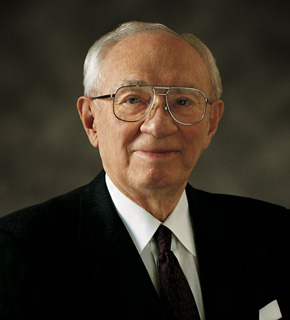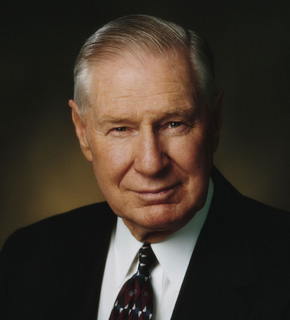[For details on succession in LDS leadership, see this post.]
Gordon B. Hinckley, 15th President of the Church of Jesus Christ of Latter-day Saints (Mormon), passed away earlier today, at age 97.
No man ever came to office of LDS President more prepared than Pres. Hinckley. Long before he was called to the Quorum of the Twelve in 1961, he traveled the world for the LDS Church, helping to establish missionary efforts in countries where the Church had little presence. In 1981, he was called as a counselor to the First Presidency and within a short time found himself as the only fully functional member of that Presidency, as old age and illness limited the activity and capacity of both Pres. Spencer W. Kimball and 1st Counselor Marion G. Romney. He encountered a similar situation as a counselor to Pres. Ezra Taft Benson. Through both periods, he showed the greatest respect, restraint, and deference to the President of the Church. Finally, upon the death of President Howard W. Hunter, he became the 15th President of the LDS Church — and unleashed an era of change and worldwide expansion that had not been seen since the administration of Pres. Kimball 20 years earlier.
There are many things for which Pres. Hinckley will be remembered, including his quick wit, his frank talks at General Priesthood Meeting, and his amazing global travels over the past 50 years. But a century from now, I believe he will most be remembered for the incredible expansion of LDS temples worldwide. When he came into office in March of 1995, the LDS Church had just 47 temples in operation worldwide. Today, just 13 years later, there are over 124 temples in operation, with another 12 announced or under construction.
If you’ve read Pres. Hinckley’s biography, you know that during the years his family was growing and growing up, he would constantly remodel and expand their family home as required, doing all the work himself. However, in his later years, he and his (late) wife Marjorie moved into an apartment in downtown Salt Lake City next to the Church Office Building. While Sandra and I lived back in Washington DC, we got to know a sister in our ward, Marion Hardy, whose late husband had been missionary companies with Pres. Hinckley in England many decades earlier. She told me about visiting Pres. and Sister Hinckley in Salt Lake City a few years earlier. Pres. Hinckley (or “Gordie” as she called him) was showing her around the apartment when he led her over to a closet. Smiling, he opened the door — and there, neatly organized, were the myriad of tools that he had used over the decades to remodel their old house and perform his other construction and repair chores. He had little need or use for them, but he could not bear to leave them behind when he and his wife moved downtown.
Another true story, for I was there. Either 20 or 30 years ago, while I was at BYU — I honestly don’t remember if it was when I was an undergraduate or when I was teaching there — Pres. Hinckley came down from Salt Lake City to speak at the BYU multi-stake fireside held ever Fast Sunday evening in the Marriott Center on the BYU campus. When he got up to speak, he noted that he had encountered some reckless and inconsiderate drivers on the freeway on the way down to Provo. He said that it reminded him of a story he had once heard:
A Quaker farmer went out one morning to milk his cow. After he had been milking for a few minutes, the cow pulled up its hind leg and kicked the farmer, sending him sprawling. The Quaker quietly got up, brushed the straw off, and continued to milk. A few minutes later, the cow again jerked its hind leg and knocked the farmer off his stool. Again, the Quaker got up, brushed off straw and dirt, sat down, and continued to milk. A few minutes later, the cow let loose with both feet, knocking over not just the farmer but the almost-full bucket of milk, which emptied out all over the floor. The Quaker slowly got up, brushed himself off, and walked around to the front of the cow. He looked the cow in the face and said, “I cannot curse thee, and I cannot strike thee — but I can sell thee to the Methodist down the road who will beat hell out of thee.”
There was a collective gasp as 23,000 BYU students and faculty members took in the fact that an Apostle of the Lord had just said that in a Church fireside on a Sunday evening — and then a roar of laughter that lasted for quite some time.
I will miss President Hinckley, but I cannot grieve too much for his passing. He served the Lord and His Church unfailingly and with great effort and sacrifice for over 70 years, and I’m sure he has missed his wife Marjorie since her death back in 2004. He deserves the rest and the sweet company of his beloved wife. May the Lord bless his children, friends, and colleagues and help all of us to live up to his example and goals.
Our prayers and thoughts are also with Pres. Thomas S. Monson, who as the senior living Apostle, will serve as the 16th President of the Church of Jesus Christ of Latter-day Saints. ..bruce..
NOTE: Peggy Fletcher Stack (at the Salt Lake Tribune) has a well-written, detailed and thoughtful obituary for Pres. Hinckley.
NOTE: This appears to be the origin (or, at least, an earlier version) of the joke that Pres. Hinckley told at the fireside.

